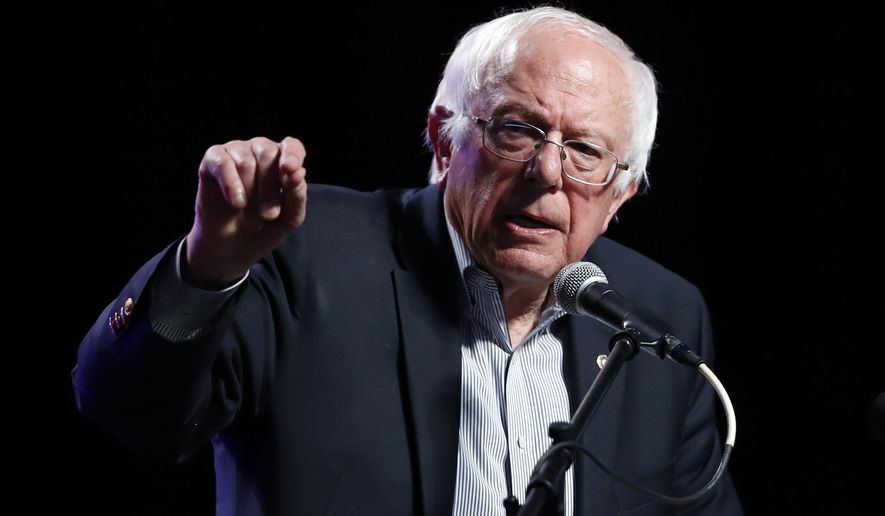Left-wing activist Cornel West said Monday that he wants to see Sen. Bernard Sanders sever ties with the Democratic Party and launch a third party molded on the Vermont independent’s progressive vision.
As Mr. Sanders tries to figure out his role in national politics, the 75-year-old’s supporters are divided over how tied he should be to the Democratic Party, with some saying they’re gaining ground within the Democratic National Committee, while others say the party is rotten and must be forsaken.
One faction of grass-roots activists plans to deliver roughly 100,000 petitions to Mr. Sanders’ office this summer, timed to the first anniversary of the Democratic presidential convention that denied him the nomination, urging the senator parlay his failed presidential bid into a new “People’s Party.”
“Delivering the signatures on the anniversary of the DNC convention when the process of stealing the votes, stealing the primary from Bernie, was sealed and completed — I think there would be no more fitting time of when that process was completed,” Nick Brana, founder of the Draft Bernie for a People’s Party, told The Washington Times.
But other Sanders backers said they’re making headway, even if slowly, within the Democratic apparatus, and said Mr. Sanders is critical to making that work.
“The reality is the Democratic Party is the place where we have to say ’let’s work to make the Democratic Party what it says it is, which is a party for working people,’” said Isaiah J. Poole, spokesman for People’s Action. “We see Bernie’s work as moving toward that goal. We see our work electoral as moving toward that goal to make the Democratic Party a party of ordinary people and not of Wall Street and the big corporations.”
People’s Action sponsored a “Rise Up: From Protest to Power” convention in Washington on Monday featuring Mr. Sanders, who encouraged attendees to keep up his fight against income inequality, against a GOP intent on punishing women, workers and the poor, and against a Democratic Party that “is not paying the kind of attention to the needs of workers.”
“This is what the political revolution looks like and you are what the revolution looks like,” Mr. Sanders said. “When people begin to stand up and fight back, when people understand that they have the power if they choose to exercise that power that is what the political revolution is about.”
The appearance here came hours after Mr. West said in an op-ed in the Guardian that “the time has come to bid farewell to a moribund party that lacks imagination, courage and gusto.
“The monumental collapse of the Democratic party — on the federal, state and local levels — has not yielded any serious soul-wrestling or substantive visionary shifts among its leadership,” Mr. West said. “Only the ubiquitous and virtuous Bernie remains true to the idea of fundamental transformation of the party — and even he admits that seeking first-class seats on the Titanic is self-deceptive and self-destructive.”
Indeed, Mr. Sanders has focused his post-election energy on revamping the Democratic Party from the inside-out and at the same time said Democrats who want to maintain the status quo “would rather go down with the Titanic so long as they have first-class seats.”
Mr. Sanders also has said Democrats should have invested more in winning a special congressional election in Kansas, which a Republican won by just 7 percentage points, and said in a recent joint interview with DNC Chair Tom Perez on MSNBC that he still doesn’t consider himself a Democrat. Mr. Sanders has described himself a socialist for decades.
Still, Mr. Sanders did accept a position in Senate Democratic Leadership and did throw his muscle behind Rep. Keith Ellison, who lost to Mr. Perez in the race for DNC chair.
Mr. Perez named Mr. Ellison as deputy chairman — a move that helped ease some of the lingering frustration among activists over Mr. Perez’s support for Hillary Clinton in last year’s Democratic presidential primary.
“The fact that Perez felt compelled to make Keith Ellison vice chair, that did send a message,” Mr. Poole said. “The fact that a vice chairmanship was created immediately upon his election — that, well frankly, would not have happened without the agitation from Sanders and the Sanders’ movement. It was a clear concession, no doubt about it. I take that as incremental progress.”
• Seth McLaughlin can be reached at smclaughlin@washingtontimes.com.




Please read our comment policy before commenting.